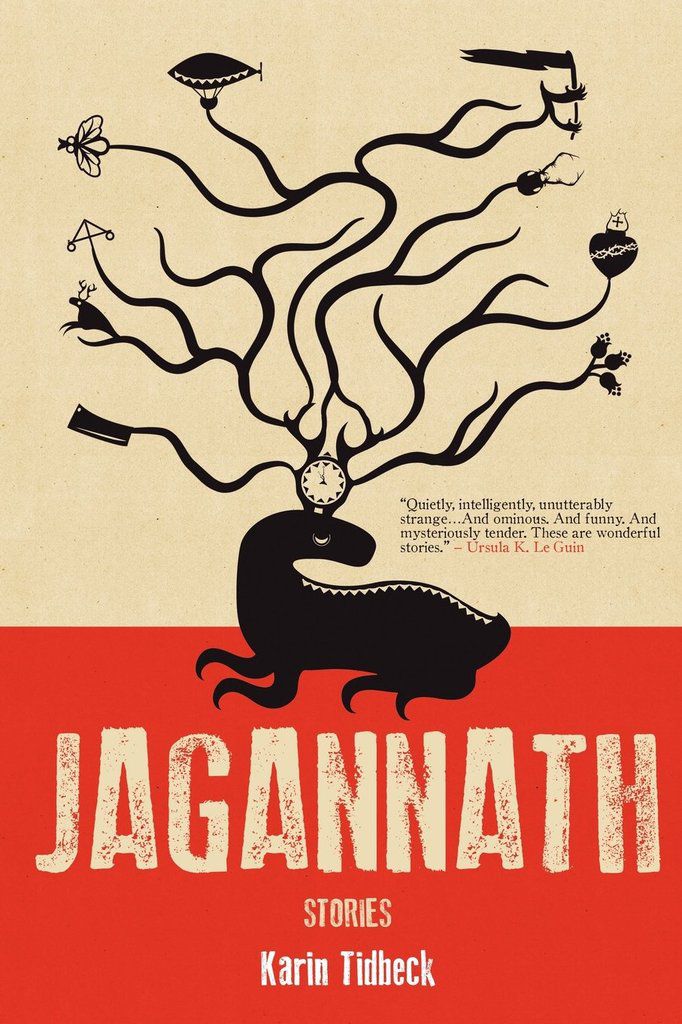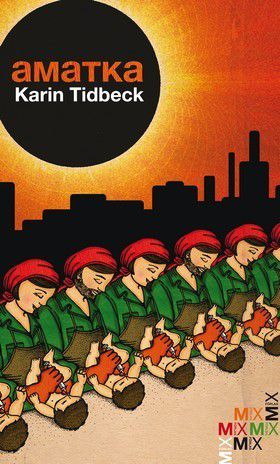I loved Amatka, and thanks to Marie Surgers from La Volte, I've been able to ask Karin Tidbeck a few questions by email. Thanks again !

Could you please introduce yourself to the French readers who don't know you yet? Where are you from, what did you study, what was your career before writing ?
I live in Malmö, Sweden, where I work as a freelance writer, creative writing teacher and translator. I’ve previously studied comparative religion and social anthropology at university, as well creative writing. I’ve also trained as a creative writing teacher. I’ve always written stories on the side while working. Previous employment include reading tarot cards, working in a bookshop, as a copywriter and some work in customer service.
I read that you were in a Clarion class with Jeff Vandermeer, is it correct ? Can you tell us what a young writer can learn in this kind of creative writing class ?
Jeff was one of my teachers at Clarion 2010. Clarion is probably the most important things I’ve ever done for my career, and I recommend it for anyone who wants to get an introduction into the English-speaking science fiction and fantasy world. You get to meet like-minded writers, have your texts critiqued (and critique the others’ texts), and get invaluable tips on how to make a career in writing. It’s a lot of work, but worth it.
Who are the authors important for you, today and when you were young ? When Amatka came out in English, a lot of reviews compared you with Ursula Le Guin, Margaret Atwood, Johana Sinisalo or Jeff Vandermeer, others talked about Kafka or Borges. Which one do you feel the most close to ?
I grew up reading a lot of books from all possible genres. I have always been very attached to the works of Tove Jansson and Ursula Le Guin. But there are a myriad of other authors I’ve read and adored, so it’s hard to make a concise list. Other authors I’ve found valuable are people such as Elizabeth Hand, Mare Kandre, China Miéville and Joanna Russ.
Do you read sci-fi or crime books ?
I read some science fiction, but these days I gravitate more towards weird fiction, surrealism and various types of fantasy. I don’t read crime.
I read that you liked LARP a lot, and how it changed how you write. Can you tell us more about it ?
I do a type of LARP that is usually called Nordic LARP: it’s more reminiscent of interactive theatre than a game (https://nordiclarp.org/what-is-nordic-larp/). I got serious about writing when creating characters for an experimental LARP back in 1999. Mostly it’s changed my approach to writing characters and character-driven stories, in a good way.
You wrote a lot of short stories before Amatka, what does this genre mean to you ?

Short stories are the way I started writing, and a natural habitat for me. It can be a difficult format, but is an extremely good tool for examining ideas and doing thought experiments.

How would you introduce Amatka ? I know a lot of writers don't like being labeled, personnaly I would say it's a mix of sci-fi, fantastic tale and dystopia...I feel like there are more and more novels that don't stay closed in one and unique genre. Amatka reminded me a lot of a fantastic tale at some points, even if Vanja is not the typical tale protagonist, it's mostly because of the strangeness coming from the book. On top of that there some moments closer to horror... Did you have conscience of that while writing ?
I would introduce Amatka as a thought experiment about language and reality. I don’t consider genre when writing, and I know that some readers are frustrated because they can’t easily place the novel in a particular genre. It’s up to the reader what genre the book belongs to, if they absolutely have to categorize it (I don’t think it’s that important). The story is the important part. The category comes second.
How would you define "new weird" to the people who haven't read Johana Sinisalo, Jeff Vandermeer, or China Mieville ?
The New Weird is a term that’s constantly up for discussion and no one can agree what it is. I had a talk with Johanna Sinisalo at a convention, and we agreed that we can’t quite categorize it. Perhaps that’s what the weird is: the unfathomable, that which slips between your fingers as you try to define it.
Where do the names of the characters come from in the novel ?
The names of the characters are a mix between Swedish, Slavic, Finnish, Southern European and Middle Eastern names – an approximation of the culture that the people come from. To me, they’re not super interesting; there’s no deeper meaning to the names “Vanja”, “Nina” or “Evgen” for example. The names of the places are randomized strings of letters.
I read that the origin of Amatka is kind of special, at first it was some poems, then a short story, is it true ? Can you tell me more about the origin and your inspirations ?
Part of the environment in Amatka comes from a poetry collection based on dreams I had back in 2002-2003. The other origin was thinking about what it would be like to live in a society where reality was literally governed by language. Amatka went through several transformations and took about six or seven years to write.

You write in Swedish and in English, is there any difference between the two languages when you write ? Did you change anything between Amatka in Swedish and Amatka in English ?
The languages work differently, as they have different cultural contexts. My Swedish tends toward the constricted and terse, while my english is slightly more floral. But these days I think my own voice comes through in both languages. I didn’t change much in the language while translating Amatka, but the story itself had an editorial treatment before publishing. We worked with the dramatic structure and some character development.
How did you come up with the idea of using the language and the writing like this in the novel ?
Like most other ideas, it’s not about “coming up” with something. The idea comes to you, it arrives. I don’t know where ideas come from. They’re a result of what you experience, read and write.
Did you read Samuel Delany ?
I have. I especially enjoyed Babel-17 and his short story collection Aye, and Gomorrah.
The different covers for Amatka are gorgeous, did you have something to say about any of the illustrations, and what is your favourite ?




I don’t have a favorite, I think they all have their own special beauty. In general I’ve been very lucky with cover artists.
I don't know if you heard about it, Muriel Penicaud, the french secretary of Labour, said recently that it was « important for science fiction to seize the topic of work »... It's already the case in France with a lot of french writers thinking about what new forms work could take now and in the close future, there even has been a collection of short stories that came out last year titled « Demain le travail » (« Tomorrow the work »), published by La Volte, and some writers regrouping in kind of a collective to think about what science fiction means when it comes to society and sociological or political questions...I'm sure it's the same thing around the world. And we don't even talk about all the books by William Gibson, John Brunner, Ada Palmer and more..
Some french authors reacted to this declaration, like Norbert Merjagnan here : https://m.usbeketrica.com/article/science-fiction-ministre-du-travail-muriel-penicaud
It's close to one of the eternal questions of the purpose of the writer, or of Litterature in general, is it purely for entertainment sake or to make think about political or philosophical issues ?
What do you think about it, would you like to say something about this subject ?
I think it’s a dangerous thing to say “you need to write about this subject”. Literature shouldn’t be controlled, and writers don’t have an obligation to do anything. Also, anyone who says that science fiction hasn’t treated a certain topic just hasn’t read enough books. Science fiction has treated all subjects, ever since the genre came into being. All you have to do is go to a library or a bookstore and see for yourself.

/image%2F2927708%2F20180802%2Fob_7d2fab_image-oeuvre-soleil-cou-coupe-1000-10.jpg)



/image%2F2927708%2F20180921%2Fob_1e8ae1_chanteur-unsworth.jpg)
/image%2F2927708%2F20190408%2Fob_997f06_furtifs.jpg)
/image%2F2927708%2F20190403%2Fob_dd2af4_lightwood.jpg)
/image%2F2927708%2F20190124%2Fob_55f140_storyteller-iverson.jpg)